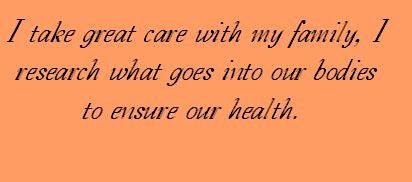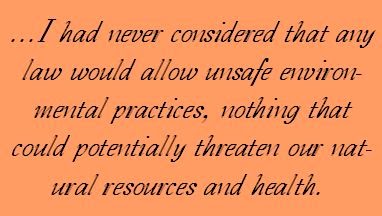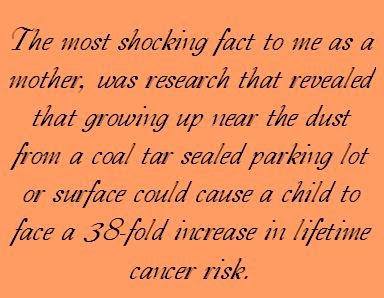In spite of all of that investigation, it just seems the issue of coal tar parking lot sealer has escaped the attention of most US mothers (and fathers for that matter). Yes there have been welcome exceptions; those moms who saw a problem, spoke up and made a difference at both a personal and a political level. Some, like the Moms’ Clean Air Force, have used their organizational clout to press for the end of coal tar pavement sealers. I am also reminded of some of the great ban enforcement work done by young moms too.
Then there are the moms that try to do everything “right” by their kids and then they realize they just placed a major source of toxicity in their own driveway because they dutifully re-sealed their driveway every year just like everyone else in the neighborhood. I’ve gotten those calls from bewildered moms who feel like someone just pulled a fast one on them with little simple recourse.
In honor of moms and leading up to Mother’s Day, I thought it would be great to hear from one mom, Briana Herzog, and what she has learned about coal tar sealers along the way.

As a stay at home Mother my family and my home are always the most important things to me. I take great care with my family, I research what goes into our bodies to ensure our health. I research and question these things because I have found that as consumers we are often not made aware of potential risks although they may be known. I have learned that for my family’s well being I need to educate myself of the pros and cons behind everything. I am also concerned with the environmental health of our surroundings and I worry about what kind of future we are leaving behind for our children and generations to come.
I had not heard of coal tar sealants until recently. I was approached by a local businessman looking for a writer to research the dangers of coal tar sealants and work toward educating Michigan families and communities. Before this I had never considered that any law would allow unsafe environmental practices, nothing that could potentially threaten our natural resources and health. Before taking this position I put in several days of research to assure myself that this would be pursuing an ethically responsible solution for our environmental future.

In my research I came upon the information here on Coal Tar Free America, on many other sites and read multiple environmental studies conducted that reveal the dangers of coal tar sealants on our environmental and personal health. I learned that Michigan had introduced legislation in the past seeking a statewide ban on coal tar sealants but nothing had come of it. I learned that some Michigan communities, including the University of Michigan along with many cities and communities across the United States have banned coal tar sealants including statewide bans in Washington and Minnesota.
Why is coal tar sealant so dangerous, what would prompt communities and states to adopt these bans? I had no idea, so I set out to answer this question. I assumed that environmental laws would never allow for a known human carcinogen to be sprayed on roadways, driveways, near our homes and schools.. There is no way, I thought, our state would allow a chemical to be used that decreases population, life span, and causes mutations in creatures that live in our rivers, lakes and streams, threatening our fresh water supply. Sadly, I found I was mistaken. PAHs or Polycyclic Aromatic Hydrocarbons are found in coal tar sealants at levels 1000 times higher than in other asphalt based sealants.
The most shocking fact to me as a mother, was research that revealed that growing up near the dust from a coal tar sealed parking lot or surface could cause a child to face a 38-fold increase in lifetime cancer risk. This dust is especially toxic to children under 6 years of age. The levels measured in these homes exceed those that the EPA deems worthy of cleanup at toxic waste sites because they are likely to cause cancer in more than 1 person of every 10,000 people exposed. This is not a risk I would voluntarily take nor is it a risk that I would willingly expose my child to.


